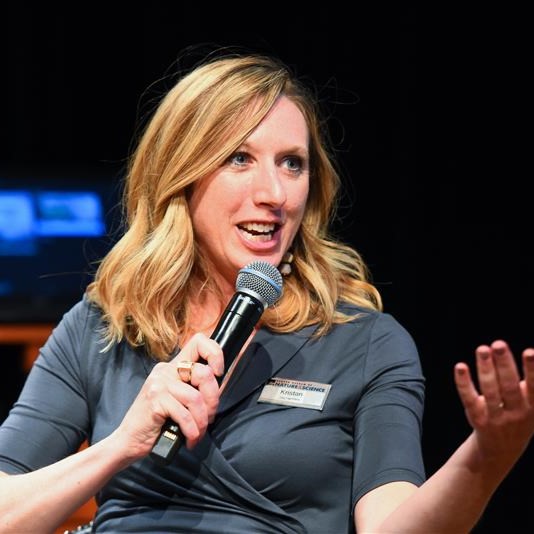Whom Do You Trust in a Crisis?
Nothing in life is to be feared. It is only to be understood.
Now is the time to understand more, so that we may fear less.
– Marie Curie
As a major pandemic unfolds, the role of science in making decisions – including how it’s being used and trusted – is on full display. It’s a massive experiment happening in real-time, and while there are parallels in history, nothing is exact. Decision makers, businesses, and the public are having to trust scientists, the data they produce, and the institutions where they work to help prevent the spread of the coronavirus.
Society functions because of trust, which offers reliability and expectations. But who carries that trust hinges on a multitude of factors. Moreover, whether or not people listen and follow that information presents an even greater entanglement of challenges swaddled in identity, autonomy, ego, and other human characteristics.
In a time of a crisis, trust in scientific information and scientists is a precious commodity – a commodity that, if handled properly, may propel people to follow life-saving advice. But do people trust the institutions, leaders, and experts providing them with guidance and telling them what to do? It depends.
In science we trust…some of the time
Even before the pandemic, Americans generally had a positive view of medical doctors and scientists to act in the public’s best interest. Currently, public health officials are receiving about a 9 out of 10 trust rating with the public, according to an April survey from Yale University and George Mason University. A Pew Research Center survey also found that the majority of Americans (79%) say they trust major health organizations, like the Centers for Disease Control, to protect them from a major outbreak.
While trust in medical institutions and providers remains somewhat high, trust in the federal government has gone down over time, as well as trust of people in positions of power. The federal government polling started in the late 1950s, when trust was much higher than today, and shows bumps when the economy is doing well or major events happen, like 9/11. What’s interesting is that while general support for government is low, various agencies are receiving high marks, such as the CDC and Department of Health and Human Services.
This creates something of a tightrope for scientists like Dr. Anthony Fauci, director of the National Institute of Allergy and Infectious Diseases, who must represent both worlds. Dr. Fauci has become a spokesperson for the federal coronavirus pandemic response and is one of those trusted experts that the public, many elected officials, and even the NBA will listen to. His consistency and ability to correct misinformation has given Americans a voice to trust.
Society functions because of trust, which offers reliability and expectations. But who carries that trust hinges on a multitude of factors.
Scientists have historically played a critical role during crises, even at the risk of retaliation or litigation. After the 2009 L’Aquila, Italy earthquake, scientists were convicted of manslaughter for failing to predict it (and later acquitted on appeal). Politics can also interfere. Some epidemiologists have found their coronavirus modeling data and advice politicized. Climate change researchers know this all too well, having seen politics and political identity degrade some Americans’ trust in science.
Beyond experts and institutions, trust with one another also poses a challenge.
A 2018 Pew Research Center survey showed that 70% of Americans think that having low trust in each other makes it harder to solve problems and that this trust has been shrinking. The Center also did a survey in mid-March focused on COVID-19, finding a “modest but statistically noticeable improvement in people’s views about others’ altruism.” The same report shows 35% of Americans register low levels of trust in other people. Conversely, 29% are classified as “high trusters,” meaning they believe people will be fair and help each other. The rest of Americans surveyed remain mixed.
Roderik Kramer, a social psychologist, argues that while people are naturally inclined to trust each other, this can create a double edged sword. He suggests that people struggle to discern between trustworthy versus untrustworthy. Knowing this tendency implies that we should safeguard trust, especially when the consequences of false or harmful information could be catastrophic.
Through values, honesty, and transparency, we can build trust
Social capital and relationships become the byproduct of a trusting society. “To the extent that people can trust others, they can work together to create benefits that each individually cannot generate alone,” writes Dunning and colleagues in the Journal of Economic Psychology. This idea underscores the value of collaboration, which places trust at its core. But to achieve collaboration, we must start with common ground or other ways to connect.
Each of us has a repertoire of people and sources that we trust, which are often associated with our values, beliefs, and experiences. In the book, Why Trust Science?, Naomi Oreskes argues that insisting on value-neutrality in science is a mistake.
“Even as we disagree about many political issues, our core values overlap to a great degree. To the extent that we can make those areas of agreement clear—and explain how they relate to scientific work—we might be able to overcome the feelings of skepticism and distrust that often prevail, particularly distrust that is rooted in the perception of a clash of values,” Oreskes writes.
70% of Americans think that having low trust in each other makes it harder to solve problems and this trust has been shrinking.
The language we use emerges as part of the problem, or solution, with establishing trust. Superlatives can motivate people to care but potentially alienate those who may not agree with the position or have a more nuanced view of the world. This happens in political rhetoric, the news, and social media all the time. See what happened there? Not really all the time but some of the time. The words we choose and how we use them serve to build relationships, communicate across sectors, and create an opening to let in different ideas and thoughts.
I’ve had people ask me: How do you know a source of information can be trusted when everyone has their own agenda? First, I agree. Second, I think we should approach much of what we read or hear with a healthy dose of skepticism until we ask some questions. Who is providing this information and are they considered experts in this field? Is there consensus? Do they have a financial or other incentives? How transparent is the information?
Not all of these questions are easy to answer, which is why we often have to place trust in experts and institutions to serve the interests of a majority of people. Experts and institutions that have built up credibility – credibility that has been earned, respected, and maintained over time.
Transparency can help. At times, data can provide sensitive information, such as medical records or personal information, and shouldn’t be released. But greater transparency can, for the most part, help build trust. So can honesty. I encourage the approach to ask questions and listen first. We can then use this information to make our point in a clear, accessible, and useful way.
A little uncertainty is probably OK
Science is nuanced and often comes bounded in some level of uncertainty. This can be particularly challenging when policymakers need to trust that the scientific information they’re relying on will provide the best outcome. Their job isn’t easy, and it isn’t built on just what the science says. They’ve got their constituents, values, politics, and a whole suite of issues to take into account. This is why, especially during a time of crisis, experts and policymakers must work in concert. And this is why scientists must be able to communicate their work, provide as much certainty as possible, and understand that policy is not a one-way street to a science-based answer.
Communicating what is known (certainty) and what is unknown (uncertainty) demands a skill that’s hard to master. Weather forecasters represent a good example of earning trust while communicating uncertainty by giving people a range of what to expect to inform their decision. It’s not to be understated that media wields power here too, especially in how they cover predictions, projections, and uncertainty.
While policy searches for certainty, the world doesn’t guarantee it. Communicating uncertainty about facts and numbers has not been well studied, but a recent PNAS study indicates that it has a minor effect on people’s trust.
“It’s somewhere between 25 and 50 percent,” Dr. Fauci said in a briefing discussing how many people are infected with coronavirus but don’t show symptoms. “And trust me, that is an estimate.” Even with these caveats, Fauci perseveres as America’s trusted doctor.
A crisis can overwhelm but also create great learning opportunities if we approach with integrity. Once trust is lost, it’s difficult to regain. If we’ve earned someone’s trust or come from a position of trust privilege, then we must work to honor it by listening, finding ways to connect, communicating with accuracy, and acting with empathy, honesty, and transparency.
I hope we’re going to look back on this moment in history and celebrate how accurate scientific information and transparency helped us in managing the pandemic. We have opportunities and challenges ahead that will require experts and honest brokers and trust in each other. When the next crisis arrives, will we have learned the right lessons from this one?


Executive Director, Institute for Science & Policy
Disclosure statement:
The Institute for Science & Policy is committed to publishing diverse perspectives in order to advance civil discourse and productive dialogue. Views expressed by contributors do not necessarily reflect those of the Institute, the Denver Museum of Nature & Science, or its affiliates.
